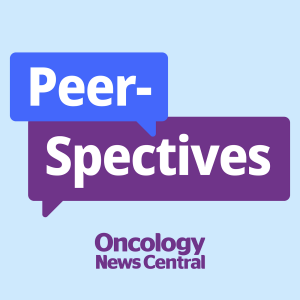Episodes

Thursday Jun 20, 2024
Thursday Jun 20, 2024
From ASCO 2024, Dr. Robert Figlin speaks with Dr. Samer Al Hadadi from University of Arkansas. "Very Important" Myeloma Data: ASCO Highlights, Smoldering Challenges, and More.

Monday Jun 17, 2024
Monday Jun 17, 2024
From ASCO 2024, Dr. Robert Figlin talks with Dr. Lauren Averett Byers from MD Anderson Cancer Center. Durvalumab's Benefit in SCLC "Beyond What We Might Have Expected"

Thursday Jun 13, 2024
Thursday Jun 13, 2024
From ASCO 2024 New Standard of Care in Melanoma? Neoadjuvant Immunotherapy Offers "Fantastic" Potential, Expert Says. Dr. Robert Figlin speaks with Dr. Christian Blank from Leiden University

Monday Jun 10, 2024
Monday Jun 10, 2024
From ASCO 2024, Dr. Robert Figlin welcomes Dr. Aditya Bardia from UCLA Health Jonsson Comprehensive Cancer Center. Should All Breast Cancer Patients Get T-DXd? "Results of DESTINY-Breast06 Do Suggest That"

Monday May 06, 2024
Monday May 06, 2024
Especially in rural areas, the growing oncologist shortage has “gotten to crisis level,” says Harsha Vyas, MD, president and founding partner of Cancer Center of Middle Georgia in Dublin. “We just don’t have enough supply of medical oncologists/hematologists,” he tells Robert A. Figlin, MD, the Steven Spielberg Family Chair in Hematology-Oncology at the Cedars-Sinai Cancer Center in Los Angeles. Dr. Vyas puts forth his ideas for potential solutions, ranging from medical school debt repayment to congressional intervention. As Dr. Figlin notes, “we need to rethink” current approaches because there’s a “storm” on the horizon and “we’re all seeing it coming.” Dr. Vyas reported no relevant financial relationships. Dr. Figlin reported various financial relationships.

Tuesday Apr 16, 2024
Tuesday Apr 16, 2024
The development of noncovalent Bruton tyrosine kinase (BTK) inhibitors and other advances in chronic lymphocytic leukemia treatment signify that the “future is really exciting,” says Jennifer A. Woyach, MD, professor in the Division of Hematology at The Ohio State University in Columbus. Dr. Woyach speaks with Robert A. Figlin, MD, the Steven Spielberg Family Chair in Hematology-Oncology at the Cedars-Sinai Cancer Center in Los Angeles, about the potential of moving these new drugs into the frontline setting and other questions related to BTK inhibitor resistance. Dr. Woyach reported various financial relationships. Dr. Figlin reported various financial relationships.

Friday Mar 29, 2024
Friday Mar 29, 2024
Given recent data, how should oncologists choose a tyrosine kinase inhibitor (TKI) in patients with EGFR-mutated non-small cell lung cancer (NSCLC), and when should chemotherapy be introduced? “It’s better to have choices than not,” explains Paul Bunn, MD, the Dudley Chair in Cancer Research at the University of Colorado in Aurora. Dr. Bunn discusses how recent trials influence treatment decisions in NSCLC with Robert A. Figlin, MD, the Steven Spielberg Family Chair in Hematology-Oncology at Cedars-Sinai Cancer Center in Los Angeles. Dr. Bunn stresses why molecular testing is so crucial and previews what additional findings are likely to further change practice in patients with EGFR-mutated NSCLC.

Tuesday Mar 26, 2024
Tuesday Mar 26, 2024
The treatment of biochemical recurrence in prostate cancer “is set for rapid development over the next few years,” says Edwin M. Posadas, MD, medical director of the Center for Uro-Oncology Research Excellence at the Samuel Oschin Comprehensive Cancer Center at Cedars-Sinai Medical Center. Data from the recent EMBARK trial have changed practice for the treatment of men with high-risk features. Dr. Posadas discusses these findings and related advances with Robert A. Figlin, MD, the Steven Spielberg Family Chair in Hematology-Oncology at Cedars-Sinai Cancer Center in Los Angeles. They also consider how the growing role of prostate-specific membrane antigen (PMSA) positron emission tomography (PET)-CT is “really impacting” care for patients with prostate cancer who have biochemical recurrence. Dr. Posadas explains why the best approach for patients with negative PSMA PET-CT results who have high-risk features remains “a point of great discussion.”

Thursday Mar 21, 2024
Thursday Mar 21, 2024
The U.S. Food and Drug Administration’s recent accelerated approval of a tumor-infiltrating lymphocyte therapy in metastatic melanoma “is a real milestone,” after the approach was “pending for decades,” explains Jeffrey S. Weber, MD, PhD, deputy director at the NYU Langone Perlmutter Cancer Center. Dr. Weber, who was part of the team to first work with the treatment in the late 1980s, discusses the breakthrough with Robert A. Figlin, MD, the Steven Spielberg Family Chair in Hematology-Oncology at Cedars-Sinai Cancer Center in Los Angeles. They examine what this accelerated approval means for practice and consider the "incredibly expensive cost” associated with the treatment. They also consider the evolving role of high-dose interleukin-2 in this patient population.

Friday Mar 08, 2024
Friday Mar 08, 2024
Recent advances in metastatic urothelial carcinoma have meant that optimistic outcomes are “not as much of a fairytale,” says Robert Dreicer, MD, deputy director of the UVA Cancer Center and professor of medicine and urology at the University of Virginia School of Medicine in Charlottesville. From the recent approval of enfortumab vedotin plus pembrolizumab to other key findings recently presented at the American Society of Clinical Oncology Genitourinary Cancers Symposium, Dr. Dreicer discusses “paradigm-shifting” advances with Robert A. Figlin, MD, the Steven Spielberg Family Chair in Hematology-Oncology at Cedars-Sinai Cancer Center in Los Angeles. Dr. Dreicer explains the “deal-breaker” that renders one treatment strategy “a relative no-brainer” for certain patients, as well as what upcoming data are likely to change practice even more.

